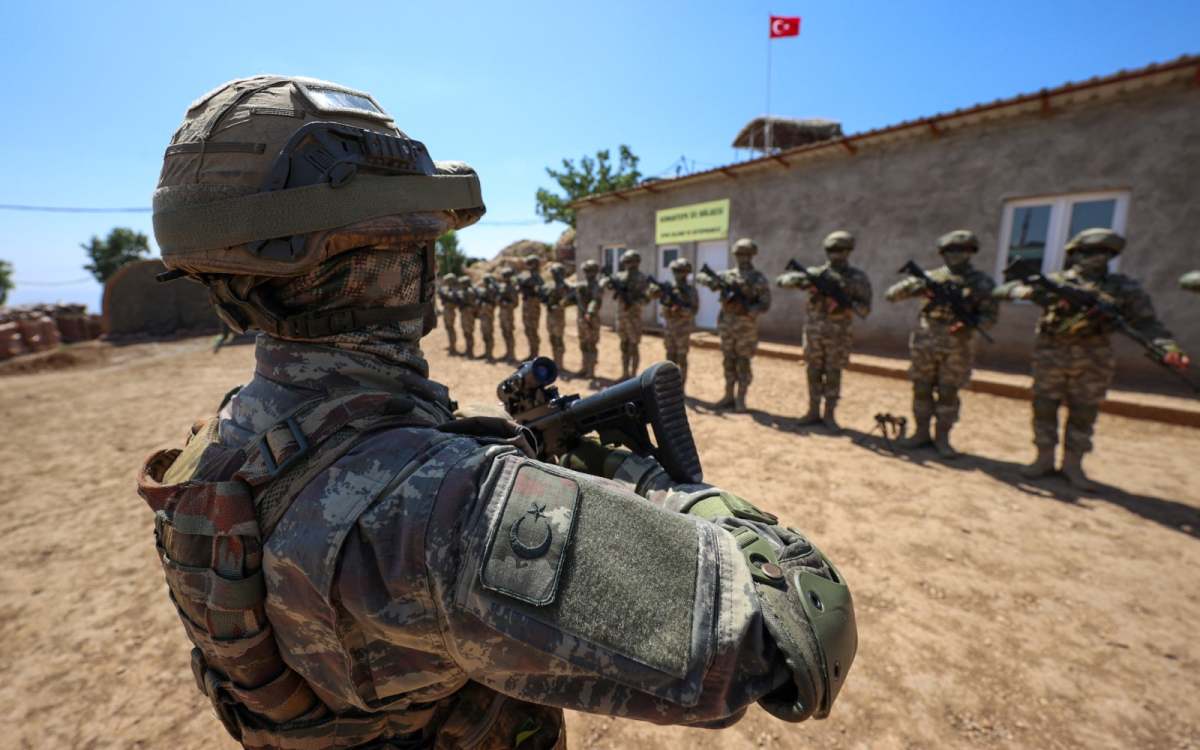Ankara & Baghdad Security Agreements: Turkey Writes, Iraq Signs!
By Shoresh Darwish
Where does ‘security’ end and ‘occupation’ begin?
Iraqi Foreign Minister Fuad Hussein and his Turkish counterpart Hakan Fidan signed the initial letters of a memorandum of understanding for military and security cooperation and counterterrorism on August 15th, 2024. This marks a continuation of the security agreements signed in Baghdad on April 22nd, during a visit by Turkish President Tayyip Erdoğan, which included a series of agreements covering not only security but also energy, trade, water, transport, health, education, and the establishment of a joint planning group headed by the foreign ministers of both countries. The ‘strategic framework’ agreement was also signed during this recent visit by Turkey’s President.
In March, prior to Erdoğan’s visit to Baghdad, the Iraqi government classified the PKK (Kurdistan Workers’ Party) as a ‘common threat’ and later designated it as a ‘banned organization’. Iraq’s official adoption of these labels regarding the party facilitated Erdoğan’s agreement to the proposed visit as well as the signing of multiple agreements and the establishment of joint committees between his government and that of Mohammed Shi’a al-Sudani.
To reinforce the policy of providing incentives before the Iraqi delegation departed for Ankara, Baghdad banned three Kurdish parties on August 6th: the Yazidi Freedom and Democracy Party, the Democratic Struggle Front Party, and the Kurdistan Community Freedom Party, citing their loyalty to the PKK. This pleased Turkish officials, as the banning of these parties implied that Turkey could become a significant decision maker in Iraqi domestic politics.
The agreement signed in Baghdad and finalized in Ankara may represent one of the political puzzles that need to be understood in the context of al-Sudani’s actions, as it typically comes at the expense of Baghdad and Erbil (Hewlêr). Additionally, both Iraqi capitals have willingly bound themselves with a series of security and military agreements that were not necessarily critical, based on the current conditions in Iraq and the views of its political and legal elites. Moreover, these agreements have legitimized the Turkish military presence in Iraq and granted Turkey greater flexibility in movement across regions where its military points are situated. Whereas the Iraqi parliament had previously called for the withdrawal of the Turkish army between 2015 and 2016, classifying its presence on Iraqi soil as an “occupying force,” Baghdad has now legalized this presence and burdened its future governments with the constraints imposed by these security and military agreements.
Military Intervention: A Chronic Turkish Approach
The history of Turkish military incursions into Iraq began during the Iran–Iraq War, from 1983 onwards. Faced with the ongoing war against the Islamic Republic of Iran, Iraq adopted a policy of minimizing enemies, granting Turkey the necessary green light to penetrate into Iraqi border territory. In 1984, Iraqi Foreign Minister Tariq Aziz signed a memorandum of understanding with his Turkish counterpart Vahid Melih Haliloglu, allowing Turkish forces to penetrate 5 km into Iraqi territory, with this security memorandum set to expire the following year.
Turkey’s interventions were not limited to such memoranda; from 1992 onward, it established a Turkish intelligence center in Erbil in 1993, capitalizing on the differences among Kurdish parties. In the mid-1990s, following the Second Gulf War and following the establishment of a Kurdish autonomous system in Iraq after the 36th parallel fell out of the hands of Saddam Hussein’s Iraqi central government, Baghdad permitted Turkey to extend its incursion to 20 km into Iraqi territory. In 1995, Turkey initiated Operation Steel, involving 35,000 soldiers who penetrated 40 km deep, while the front lines extended 220 km into Iraq. This major operation was subsequently followed by two smaller operations that same year.
Military intervention continued intermittently and almost annually, even after the fall of Saddam Hussein’s regime, despite the challenges posed to Turkey’s operations inside the Kurdistan Region by the American presence in Iraq and the diminishing need for Turkish support from Iraqi Kurdish parties. Consequently, Turkey’s activities were a blend of intelligence operations and limited strikes on the strongholds of the Kurdistan Workers’ Party (PKK). However, shifts in the U.S. approach to Iraq and the rumors of withdrawal accelerated Turkey’s ambitions to intervene in Iraqi affairs, hoping to fill the vacuum left by a potential U.S. withdrawal. This was driven by neo-Ottoman ambitions such as regaining control of Mosul and Kirkuk after nearly a hundred years, combating the PKK, manipulating the political landscape in the Kurdistan Region, promoting the Turkmen presence in Iraqi Kurdistan, supporting Turkmen parties loyal to it, and preventing conditions from evolving in the Kurdistan Region that Baghdad couldn’t regulate or exert control over.
Apart from the agreements and understandings among Baghdad, Kurdish parties, and Turkey, the latter has utilized a legal justification in its urgent interventions, invoking Article 51 of the United Nations Charter, which allows countries to protect their national security, thus justifying intervention in neighboring states. This same article has been employed in Turkey’s intervention—and subsequent occupation—of northern Syria (Rojava) since 2016. Regardless of how Turkey interprets this ambiguous article to suit its expansionist designs, it is legally bound to notify the Security Council of its operations under this article—something that Turkey has not done during its incursions and occupations.
From Incursion to Occupation
The peak of Turkish military engagement in Iraq began in 2014 and escalated to the present day. The total number of Turkish military bases and outposts now exceeds 110, spanning a strip more than 200 kilometers in length and ranging from 10 to 40 kilometers in width, with the number of soldiers surpassing five thousand along with numerous military experts, hundreds of armored vehicles, and tanks. Some bases have artillery positions and airstrips as well.
The recent military operation initiated by Turkey on June 26th alone resulted in the deployment of at least 300 military vehicles and the establishment of security checkpoints in the Badinan area of Duhok Province. Reports of Turkish soldiers screening Kurdish citizens, asking for their Iraqi ID cards, and inquiring about their intended locations indicate an occupational inclination by Turkish forces that are effectively asserting their dominance over rural areas. To instill fear and intimidate civilians while imposing de facto authority, the Turkish army has executed a series of scorched earth tactics, including the burning of trees, shelling mountainous areas with mortars, and ongoing gunfire.
Turkish military operations are no longer bound by specific timings or restricted to agreed-upon geographical areas with Baghdad or the ruling Kurdish parties in the Kurdistan Region. They have begun to operate as an occupying force, asserting their presence without formal agreements, with subsequent agreements emerging merely to alleviate Iraqi officials’ concerns.
The Zilkan camp example in the Bashiqa district illustrates this issue clearly. In 2016, the government led by Haider al-Abadi repeatedly called for the evacuation of this camp, to no avail. Iraq’s demands for Turkey to vacate its bases coincided with calls from the high Shia authority, Ayatollah Ali al-Sistani, for the Turkish forces to withdraw and respect Iraq’s sovereignty. However, it seems that Iraq, unable to rein in Turkey, has entered a strategy of appearing clever—legalizing Turkey’s presence to make it acceptable to Baghdad, even as that presence exists against its wishes, thus transforming a state of occupation into a component of a mutual understanding between the two neighboring countries. Accordingly, the recent agreement provides for the establishment of two security coordination and training centers aimed at cooperation in combating “terrorism”—one in Baghdad and the other in Bashiqa.

What Did Iraq Gain?
In summary, it appears that the Turkish side has achieved part of its goals for control and expansion, this time with the consent of both Iraq and Erbil. With the legalization of the military presence, the Turks now possess a significant influence in Iraqi internal affairs, which could evolve into political meddling concerning the next government, parliamentary alliances, and the administration of Iraqi provinces within Kurdistan, Mosul, and Kirkuk. Conversely, while Iraq is pleased with the agreements it has secured—as expressed by its officials during the signing of the submission contracts with the Turkish side—it may have inadvertently created a crisis regarding the protection of Iraq’s national security and the security of the Kurdistan Region specifically.
To this point, Iraq has yet to secure any strategic gains; the issue of water remains unresolved and unlikely to be addressed soon with Turkey. Moreover, neither the central government nor the Kurdistan Region will be able to effectively control the pace of Turkish military operations or hinder the establishment of bases and encampments, thus failing to protect Iraqi citizens from the ravages of the Turkish war machine. Meanwhile, the dry canal project—dubbed the “development road”—serves as an emblem legitimizing the al-Sudani’s government’s continued, unjustified engagement with Turkey and the route through which Erdoğan’s government exerts its security policies in Iraq, under the guise that all ongoing agreements and understandings are aimed at advancing this project.
With regard to some agreements that Iraq has entered into, Baghdad could have sought these with more advanced and capable nations than Turkey, particularly in sectors such as education, industry, sports, and energy, limiting cooperation to commercial exchanges, oil exports, and developing strategies to resolve Iraq’s water challenges.
Ultimately, al-Sudani’s government should have refrained from becoming embroiled in an internal conflict between Turkey and its Kurdish populace, even if this conflict transpires in difficult terrain within Iraq. It should have avoided granting Turkey the right to establish enduring military outposts and to later interfere in Iraq’s internal politics.
If it proves necessary to offer visions for resolving the puzzle posed by al-Sudani’s policies intended to appease Turkey, it can be stated that there exists an entire Iraqi political class that has excessively signed documents drafted by the Turkish government without adequately assessing the risks that await Iraq in both its Arab and Kurdish dimensions.




Comments are closed.